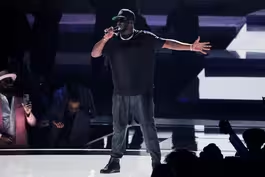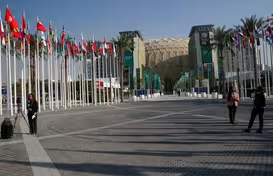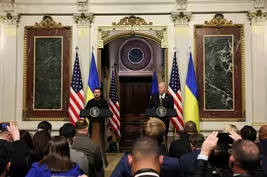
Chinese seafood processed using forced labor sold in U.S.
Clip: 12/12/2023 | 6m 59sVideo has Closed Captions
Investigation reveals Chinese seafood caught and processed using forced labor sold in U.S.
An investigation into Chinese fishing fleets and processing centers has discovered that seafood produced with forced labor is making its way to American dinner tables. That's despite a U.S. ban on imports made by workers from China’s Xinjiang province. That region is home to Muslim minority Uyghurs who have been the victims of well-documented human rights violations. John Yang reports.
Problems playing video? | Closed Captioning Feedback
Problems playing video? | Closed Captioning Feedback
Major corporate funding for the PBS News Hour is provided by BDO, BNSF, Consumer Cellular, American Cruise Lines, and Raymond James. Funding for the PBS NewsHour Weekend is provided by...

Chinese seafood processed using forced labor sold in U.S.
Clip: 12/12/2023 | 6m 59sVideo has Closed Captions
An investigation into Chinese fishing fleets and processing centers has discovered that seafood produced with forced labor is making its way to American dinner tables. That's despite a U.S. ban on imports made by workers from China’s Xinjiang province. That region is home to Muslim minority Uyghurs who have been the victims of well-documented human rights violations. John Yang reports.
Problems playing video? | Closed Captioning Feedback
How to Watch PBS News Hour
PBS News Hour is available to stream on pbs.org and the free PBS App, available on iPhone, Apple TV, Android TV, Android smartphones, Amazon Fire TV, Amazon Fire Tablet, Roku, Samsung Smart TV, and Vizio.
Providing Support for PBS.org
Learn Moreabout PBS online sponsorshipthat seafood produced with forced labor is# making its way to American dinner tables.
That's despite a U.S. ban on imports# made by workers from China's Xinjiang## province.
The region in northwest# China is home to Muslim minority## Uyghurs, who have been the victims of# well-documented human rights violations John Yang has more.
If you buy frozen seafood# at the grocery store or order fish at a chain## restaurant, chances are pretty good that it was# caught by a Chinese fishing vessel or processed## in a Chinese plant.
China runs what may be# the largest maritime operation ever known.
An investigation by the not-for-profit# journalism organization called The Outlaw## Ocean Project has documented human# rights, labor, and environmental## concerns related to the Chinese fleet.
As# Outlaw Ocean founder Ian Urbina tells us## in this excerpt from the group's reporting,# Chinese fishing ships rely on forced labor.
IAN URBINA, Executive Editor, The Outlaw# Ocean Project: Foreign journalists are## generally forb had to rely on a range of publicly available# materials, including company newsletters,## local news reports, trade data,# satellite imagery, and social media.
MAN: But the real kind of key to our# investigation became the use of the## Chinese version of TikTok, which is called Douyin.
IAN URBINA: Videos posted by Uyghurs# from sea live in military-style dormitories# under the watch of security personnel.
Uyghur workers' dorms are often searched,# and if a Koran or other contraband is found,## the owner may be sent to a reeducation camp.# Uyghurs' social media posts are also closely## monitored by Chinese online censors.
Posting# anything critical of the regime could quickly land## them in a detention center.
But it appears that# many Uyghurs have found a way to include cryptic## messages in their videos to convey their suffering# while also bypassing the Chinese censors.
Thousands of tons of seafood processed# in China with forced labor continue## to enter the United States and Europe.# Importers sent their products to major## supermarkets around the world, including# Walmart, Kroger, Tesco, and Carrefour.
The importers also sent seafood to Cisco,# the global food service giant that supplies## more than 400,000 restaurants in the# U.S. alone.
Over the past five years,## the U.S. government spent more than $200# million to buy seafood from importers'## linked to Uyghur labor for use in military# bases, federal prisons, and public schools.
JOHN YANG: This investigation represents# four years of work by Ian Urbina,## the executive editor of The Outlaw Ocean Project.
And how did you find that this labor, putting# the Uyghur sort of fit in, in the Chinese# overall strategy in dealing with## the Uyghurs?
The Uyghurs are# a Muslim minority in China.
IAN URBINA: Yes.
Uyghurs in Xinjiang and disperse them elsewhere# in the country to sort of pacify the population,## if you will.
So there's a huge state-run# labor transfer program with thousands## of Uyghurs that are forcibly removed# from this inland province, Xinjiang,## and transported 2,000 miles away to the other# side of the country to work in the factories.
And it's all part of an effort to sort of# bring this restive province under control.
JOHN YANG: Ian, you talked to about# more than two dozen of the crew members,## people who worked on these ships.# What did they tell you about the## conditions they worked under and# the conditions of their employment?
IAN URBINA: Yes, I mean, we found a lot# of forced labor and trafficked labor.
Before COVID, a lot of these workers# are Indonesian, after COVID, largely## rural Chinese.
They're pretty nervous to talk# openly when we were on board, but you could the conditions.
There are a lot of reports of# violence on board and neglect, severe neglect.
JOHN YANG: And these ships often# don't return to port for two years,## stay at sea for two years.
How did# you manage to talk to these people?
IAN URBINA: Yes, it was a process.
Typically, it takes several days just to# high seas.
Once we're out there, we make# radio contact with the capta warm the captain up and see if he will let# us on board.
If not, oftentimes, the ships## would flee and we'd get and board a faster vote# called a skiff and follow the fishing sh And, in those cases, we'd put messages in a bottle# asking questions of the crew in Bahasa Indonesian,## or Chinese and English, and throw# the bottles onto the back of the ship## and then follow them until the crew# threw the bottles back with answers.
JOHN YANG: And not only answers,# but some of them asking for help,## some of them giving you phone numbers.
IAN URBINA: Yes.
because then we could contact families# ba those families how long they'd been gone and# sort of what they knew of their lost fam JOHN YANG: You also found# violations of law and the## way they fished and also environmental violations.
IAN URBINA: Yes, many cases of shark-finning, of# invasions of sovereignty.
So and often these vessels are aggressively# going into waters where they're forbidden,## Argentinean, Chilean, Ecuadorian# waters, where they're not allowed.
So, we documented those cases just# to show how pervasive the problem is.
JOHN YANG: And how are they# able to escape enforcement## and escape inspection and that sort of thing?
IAN URBINA: These vessels# largely are on the hig and this is an area that's very hard to get to The vessels are in constant motion.
And most# countr out there patrolling their own waters, much less# the high seas.
So these are wo are largely out of reach of governments.# And that's why they can do as they please.
JOHN YANG: And there were also signs# that these ships were doing more tha fishing or fishing for other things in a way.
IAN URBINA: Yes, I mean, China's# fishing fleet is in many ways of an arm of its geopolitical agenda.# It's sort of a projection of power.
And so, if you look at places like the South# China Sea, contested waters in that area,## the fishing fleet is essentially acting as a# civilian militia.
And you have enough fishing## vessels there that they can crowd around# other countries vessels and crowd around## islands that are in contested waters and sort# of establish sovereignty and show muscle.
JOHN YANG: It's an ambitious project, and# you found out some very interesting things.
Now, where can people read and see your reporting?
IAN URBINA: With "The New# Yorker" on their Web site.
JOHN YANG: Very good.
IAN URBINA: Thanks for having me.
Biden says Israel losing support over indiscriminate bombing
Video has Closed Captions
Clip: 12/12/2023 | 2m 43s | Biden warns Israel is losing global support over 'indiscriminate bombing' in Gaza (2m 43s)
How a New York law opened 'Diddy' to sexual assault lawsuits
Video has Closed Captions
Clip: 12/12/2023 | 7m 25s | How a New York state law opened Sean 'Diddy' Combs to sexual assault lawsuits (7m 25s)
Jewish Americans on how the war is affecting their Hanukkah
Video has Closed Captions
Clip: 12/12/2023 | 3m 56s | Jewish Americans on how the Israel-Hamas war is affecting their Hanukkah celebrations (3m 56s)
What Shohei Ohtani’s unique contract could mean for baseball
Video has Closed Captions
Clip: 12/12/2023 | 6m 26s | What Shohei Ohtani’s unique $700M contract could mean for the future of baseball (6m 26s)
Why some climate experts are criticizing COP28 conference
Video has Closed Captions
Clip: 12/12/2023 | 6m 14s | Why some climate experts are criticizing what’s happened at the COP28 climate conference (6m 14s)
Zelenskyy makes case to Congress for more aid for Ukraine
Video has Closed Captions
Clip: 12/12/2023 | 12m 10s | Zelenskyy makes his case to Congress for more U.S. aid in Ukraine's fight against Russia (12m 10s)
Providing Support for PBS.org
Learn Moreabout PBS online sponsorship
- News and Public Affairs

FRONTLINE is investigative journalism that questions, explains and changes our world.

- News and Public Affairs

Amanpour and Company features conversations with leaders and decision makers.












Support for PBS provided by:
Major corporate funding for the PBS News Hour is provided by BDO, BNSF, Consumer Cellular, American Cruise Lines, and Raymond James. Funding for the PBS NewsHour Weekend is provided by...





